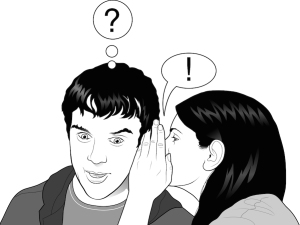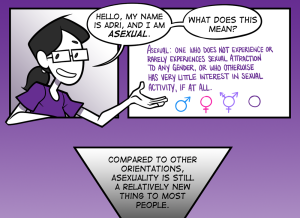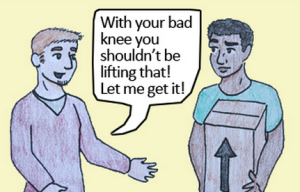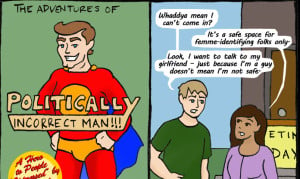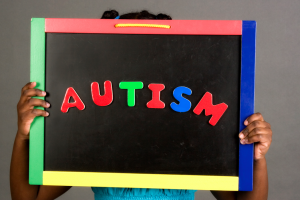(Content Warning: Suicide)
I don’t remember attempting suicide.
All I remember is waking up in my mother’s bed the next day. My hand was plastered, still aching from where the nurse inserted the drip.
Confused and disoriented, I asked my mother what had happened.
She kissed my head and tucked the blankets around me. “You overdosed. I love you,” she said. “We can talk when I get home.”
At first, I thought she meant an accidental drug overdose. But as I sat up, a flood of complex and incomplete memories from the night before washed over me. The feeling was so overwhelming, I nearly vomited.
I realized that I had tried to end my life.
It turned out that my failed attempt at ending my life was the beginning of another chapter of healing.
After my suicide attempt, one of the toughest things I had to deal with was a sense of overwhelming guilt and invalidation. I felt guilty because I felt like what I had done was selfish. I also felt confused because there was a part of me that believed my attempt was not “genuine,” but rather, an attempt at seeking attention.
These feelings made my healing process all the more difficult.
Healing after a suicide attempt is really difficult, to say the least. Being bombarded with ableist, harmful ideas about suicide make it even harder.
These myths dehumanize and delegitimize the experiences of suicidal people. For this reason, it’s imperative that we take a deep and critical look at some of the ideas we have about suicide.
Whether you’ve attempted – or considered attempting – suicide before, or whether you’re someone who has never been suicidal, it’s absolutely important that you work at recognizing and unlearning these myths.
By tackling these myths, we’ll be in a better position to prevent suicide and to give suicide survivors the compassionate support we deserve.
Myth #1: People Who Attempt Suicide Are Selfish
Commonly, when people attempt or die by suicide, we think about the affect it has on the people around them.
Of course, losing a loved one to suicide can be traumatizing. Often, people feel angry and betrayed by those who commit suicide.
The thing is that suicide is seldom about loved ones.
It’s usually about being in such a painful space that you can’t begin to protect yourself, let alone others.
In my case, I felt so overwhelmed with hurt and confusion that I felt like suicide was the only way out. I wasn’t able to take care of the needs of my loved ones. I wasn’t even able to take care of my own needs – hence the suicide attempt.
It took me a long time to shake off my guilt about my suicide and it’s something I’m still working on. Throughout this journey, I’ve tried to keep in mind one simple truth: suicide is not selfish.
In fact, I’d argue that it’s selfish to make someone else’s suicidality about yourself.
It demonstrates a real lack of empathy and compassion.
We should be allowed to put ourselves first when it comes to things like our mental health. But we shouldn’t conflate putting ourselves first with selfishness.
Myth #2: People Who Attempt Suicide Are Cowardly
There’s this notion that suicide is a “coward’s way out.”
Here’s the thing: If someone is struggling with suicidality, judging their actions as cowardly or not – especially when we don’t know their personal circumstances – is pretty judgmental and unhelpful.
Truthfully, it’s presumptuous to assume that suicidal people are cowardly. The assumption there is that whatever they’re going through will be cured with bravery. This downplays the pain they experience.
This is not just disrespectful – it also erases the core issue which needs to be addressed. Suicidality is not caused by a lack of bravery. It is caused by a number of factors, most of which link to issues around access to healthcare and other resources, prejudice, and oppression.
In many instances, we need so much more than courage to endure the difficult, painful obstacles we endure. For example, we might need support, practical help, mental health treatment, action that challenges oppression, or simply just a bit of love and compassion.
What we don’t need is someone telling us we’re cowards.
We ought to be less concerned with someone’s bravery – or lack thereof – and more concerned with how we can help them.
Suicide is sometimes labeled as cowardly in order to deter some people from trying to end their life.
Sure, this might work in some cases. But for the rest of us, the overwhelming guilt that is placed on us can make our vulnerable mental state even worse. When you’re in a state where you’re seriously considering ending your life, hearing that you’re cowardly isn’t going to help you.
Manipulating people into avoiding suicide by making them feel bad about themselves is never, ever a good idea.
Labelling suicide as a cowardly act is not only inaccurate – it’s really harmful.
Myth #3: People Who Attempt Suicide Are Seeking Attention
Often, suicide attempts are brushed off as seeking attention.
They’re often not seen as genuine efforts to end one’s life, but as a tactic to manipulate people into paying them attention.
This is incredibly invalidating, and also incredibly untrue. By reducing someone’s suicide attempt to attention seeking, we’re erasing the fact that they want to – or wanted to – end their life. This completely misses the point of a suicide attempt.
Some of us are seeking the opposite of attention – some of us need an escape and want everything to stop, and we can’t think of another way to find that escape other than through death.
Suicide should not be equated with seeking attention.
At the same time, I think it’s really important to note that seeking attention shouldn’t be seen as an inherently bad thing.
Human beings often need social interaction, love and support in order to get through trying times. Sometimes we do look for attention, especially if we aren’t given attention.
And you know what?
We deserve that attention.
Attention, along with other stereotypically feminine values such as love, nurturing, and affection, is often demonized in our society. We tend to invalidate the importance of these characteristics, but they’re truthfully incredibly critical to leading a happy and healthy life. This invalidation is a product of a misogynistic society that devalues what is thought to be feminine.
Instead, we should ask ourselves how we can ensure that more people have the attention, love and care that they deserved.
Myth #4: People Who Have Died by Suicide Haven’t Reached Out for Help
“If only they had reached out for help.”
It’s a common refrain that we hear when someone attempts or dies by suicide. I remember discussing Sylvia Plath in high school when a teacher remarked on how Plath’s death was a loss to the literary world.
“If only she asked for help,” she said. “Then she wouldn’t have attempted suicide.”
While it struck me as victim-blaming at the time, I wasn’t able to articulate my issues with her comment until much later.
People often use this trope without even understanding the circumstances of the person whose suicide they’re assessing. In Plath’s case, she was getting a form of help. As this important article points out, she was trying very hard to take care of her mental illness.
Firstly, it’s incredibly difficult to reach out for help because of the fact that suicide is seen as selfish, cowardly and attention seeking. When we discuss whether or not someone reaches out for help, we need to place emphasis on asking whether they’re able to ask for help.
People often can’t find the help they need because of stigma we face. As a society we need to work on changing our attitudes towards mental illness and suicide in order to reduce the stigma and encourage people to seek this help.
Secondly, reaching out for help is not the same thing as receiving it. I can’t tell you how many times I mentioned my suicidal thoughts to friends and family only to receive a half-hearted “sorry” without any further support, check-ins, or conversation. Many people seek help and support and don’t find it.
Often, this is because people don’t know how to engage with suicidal people. Many people aren’t sensitive to mental illness issues and – even if they are – they struggle to figure out how to comfort people who feel suicidal.
Lastly – and this might seem obvious, but we often forget it – finding help does not cure mental illness. Therapy doesn’t cure mental illness. Medication doesn’t cure mental illness. Support from loved ones doesn’t cure mental illness.
Those resources are important, but they don’t cure mental illness – they’re supposed to help you manage it. Sometimes, therapy and medication doesn’t help your mental state. Even when it does help, it often takes a long time before you start feeling better.
When I attempted suicide, I was regularly seeing a psychologist, taking anti-depressants, and receiving support from my loved ones. It wasn’t enough to deter me from overdosing.
Instead of assuming that people who attempt suicide haven’t looked for help, we need to ask ourselves how we can make help more accessible to everyone.
Myth #5: All Suicidal People Have Access to Help
Many people, particularly those who aren’t mentally ill, are under the impression that there is equality in the healthcare system. This is to say that they assume support, therapy and medical treatment is available for everyone who needs it.
As a result, people victim-blame those who haven’t managed to find the help they need.
This ties in strongly to my previous point about reaching out for help. The truth is, some people simply don’t have access to help. Financial barriers prevent a lot of people from accessing support groups, therapy and medication – all of which can work out to be pretty expensive in many places.
People also might not have access to help depending on their location. This is particularly true for people in rural communities, who might not be able to easily travel to another community to seek help and advice.
The healthcare system is often incredibly unfriendly towards transgender and queer people, too. At present, trans people in particular are abused by the healthcare system in a number of different ways. As you can imagine, trans people – who are particularly vulnerable to abuse, stigma and discrimination – are some of the people who need compassionate medical care the most.
Fat-shame is another form of oppression which exists in the medical industry. This, too, can prevent people from seeking help.
These issues are a result of societal oppressions within in the healthcare system. It’s another example of why we need an intersectional, all-inclusive approach to fighting against the kyriarchy.
In order to support suicide survivors and prevent suicide, it is imperative that we challenge inequality in the healthcare system.
Myth #6: Reaching Out for Help Is the Same Thing as Threatening Suicide
In a lot of the work that I do, I come across the notion that people who are asking for help are threatening suicide. This implies that they’re not really suicidal, but rather that they’re manipulating people by saying they will commit suicide.
I once heard a healthcare practitioner say that if someone is really suicidal, they’ll ‘just do it’ instead of looking for help. As someone who has attempted suicide, this remark broke my heart.
Once again, this idea is really invalidating. Of course, some people who are mentally ill can also be abusive – and that’s not okay. And yes, some people do use suicide threats as manipulation tactics.
But conflating all calls for help with “threatening” suicide is incredibly harmful. It makes it seem like the issue at hand is not their suicidality, but their manipulative ways.
This adds to the ableist notion that mentally ill people are naturally abusive and lacking in empathy. This criminalizes the mentally ill, and justifies a great deal of abuse which we face.
This mentality also deters suicidal people from seeking help, because we don’t want to seem like we’re trying to hurt those around us.
Our default reaction to suicidal people should not be to assume they’re being manipulative.
We should provide them with the tools, support and resources they need in order to get to a space where they feel validated and loved.
***
Selfish. Cowardly. Attention-seeking.
The way society labels suicidal people isn’t conducive to creating an environment where we’re acknowledged, loved and supported.
This needs to stop immediately. These myths are not only misleading – they’re literally causing people to lose their lives.
To help people who attempt suicide – and to honor the memories of those who die from suicide – we need to start unlearning all the harmful ideas we’re taught about suicide.
Once we shake off these ideas, we will be more capable of moving towards a more compassionate, less ableist society.
[do_widget id=’text-101′]
Sian Ferguson is a Contributing Writer at Everyday Feminism and a queer, polyamorous, South African feminist who is currently studying towards a Bachelor of Arts majoring in English and Anthropology. Originally from Cape Town, she now studies at Rhodes University in Grahamstown, where she works as vice-chair of the Gender Action Project. She has been featured as a guest writer on websites such as Women24 and Foxy Box, while also writing for her personal blog. Follow her on Twitter @sianfergs. Read her articles here.
Search our 3000+ articles!
Read our articles about:
Our online racial justice training
Used by hundreds of universities, non-profits, and businesses.
Click to learn more







